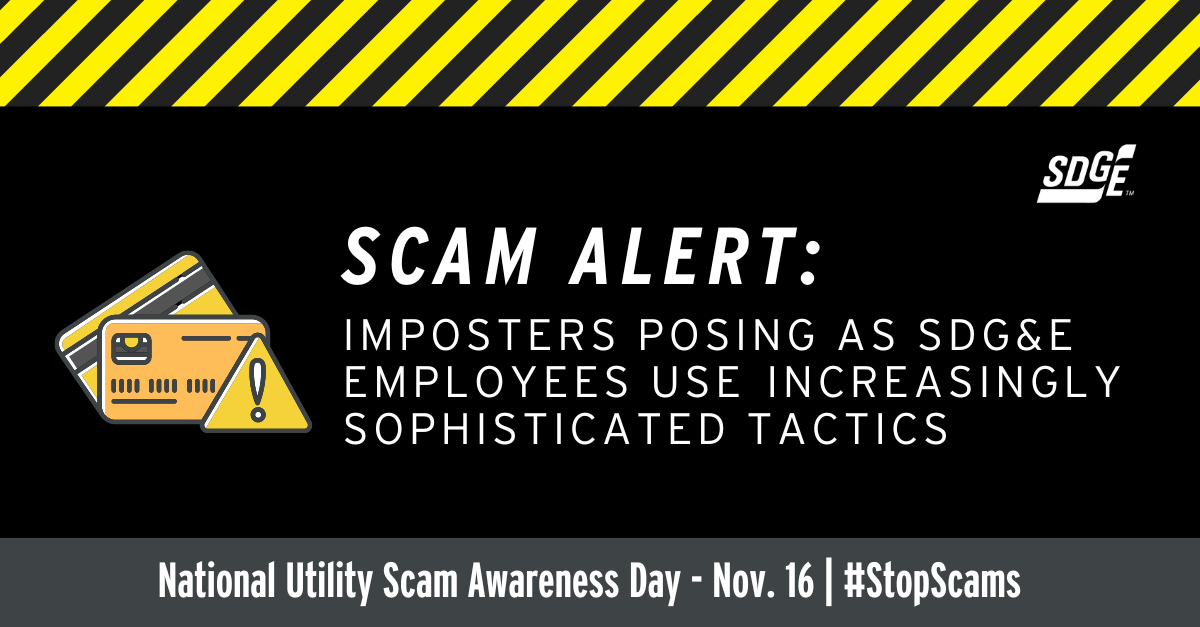To Mark National Utility Scam Awareness Day on Nov. 16, SDG&E Provides Tips to Defend Against Scammers
With the holidays just around the corner – a time of the year when scammers often strike, San Diego Gas & Electric (SDG&E) is warning customers to be on the look out for imposters who pretend to be SDG&E employees over the phone or in person, threatening service disconnections if payments are not made immediately. SDG&E is joining utilities across the nation to mark Utility Scam Awareness Day on Nov. 16 by sharing tips on how to spot scams.
Top targets of utility impersonators include limited-English speakers, the elderly and small businesses – particularly restaurants. Scammers are using increasingly advanced tactics and technologies to defraud their victims, including phone spoofing where they manipulate the caller ID to display SDG&E’s customer service number, so victims think that they are receiving a legitimate call.
Last month, Mark Cafferty, president and CEO of San Diego Regional Economic Development Corporation, experienced an elaborate ruse firsthand when an SDG&E impersonator made several calls to him indicating his gas and electric service was about to be shut off due to non-payment. The number that appeared on his caller ID was SDG&E’s customer service number. He immediately called SDG&E and then took to social media to alert the business community.
“Business both large and small must remain vigilant. Because of the sophistication of the fraud, an unsuspecting, well-intentioned business entity could easily fall into this trap and the losses are sometimes staggering,” he said.
Earlier this year, a local business incurred a significant financial loss when the impersonator kept telling the business that its electronic payment did not go through. The fraudster capitalized on the confusion, and the business made payments over and over three times before realizing the scam.
How the Ruse Works
The ruse most often includes a caller posing as a utility collections employee. Victims are told their account is delinquent and that a technician will arrive within the hour to shut off their electricity if they do not pay the past due amount immediately. Victims are asked to pay with non-traceable Bitcoin, payment apps such as Zelle, Green Dot debit cards, or other non-traditional forms of payment that SDG&E does not use.
Utility scams have grown in sophistication, with the victim being passed off to other role players to give the perception the imposter is calling from a large organization. When a scammer’s number shows up on caller ID as being different from a utility’s customer service number, the scammer may claim the number on the caller ID does not match the utility’s phone number due to the company’s COVID-19 remote work policy.
Scammers capitalize on victims whose livelihood depends on a consistent source of electricity. For example, they have been known to call restaurateurs just prior to the lunch hour to add pressure. The owner, depending on the noontime crowd, may comply with fraudulent demands for payment.
Tips to avoid becoming a victim
- SDG&E will never call to demand immediate payments be made over the phone with the threat of immediate service disconnection. SDG&E provides a variety of payment assistance programs to customers and sends multiple notices to customers before disconnecting service.
- SDG&E will never ask customers to pay using digital payment apps or cryptocurrencies. The only bill payment options SDG&E uses are MyAccount, a Branch Office location, an Authorized Payment Location or BillMatrix, which accepts payment with a credit card via phone.
- SDG&E customers who are uncertain about their account status should call SDG&E or look up their bill and payment history via sdge.com/MyAccount.
- Never use the call back number provided by an unknown caller to verify billing information.
Fraud complaints can be filed with the Federal Trade Commission at ReportFraud.ftc.gov. To learn more about common scams and signs, visit UNITED - Home (utilitiesunited.org).


